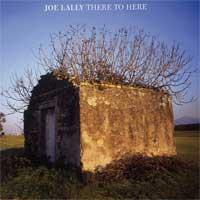The bass player. The ever-loving butt joke of the band. The can't-catch-a-break in movies and television guy -- no one wants to be the bass player. It's boring! Bass is just a few notes played over and over again, right? Just a foundation. I mean, look at the White Stripes and the Black Keys, possibly the Grey Strings or the Neutral Toned Objects. No bass necessary. So what happens when the bass player of a legendary band wants to record his own album?
Sadly, what usually happens is that said bass player abandons the instrument that so trustily kept him going throughout the years. John Doe, Paul McCartney, Sting -- they all respect the instrument, they all adore the instrument -- but they ignore it. Which is why Joe Lally's new(ish) album, There to Here, seems so out of place in American pop music.
Lally relies on the instrument that he's always played to carry not only the foundation but the melody of the song. Oftentimes there is no other accompaniment besides drums, or maybe a bit of guitar in the background. But there's one thing for sure -- There to Here relies on the Lally's words more than anything. The openers "Reason to Believe" and "The Resigned" are two bass 'n drum tracks (not "that" sort of bass 'n drum) that hint at Lally's lyrical brilliance. Lines like "There's reason to believe we're starting at the end / there's reason to believe nature comprehends and the microscopic fundament on which everything depends must be respected or will retaliate" or "This one goes out to the living dead / not the news anchors or the people we dread" float gently from Lally's silver throat over simple, thumping basslines. But what I'm talking about is when "Sons and Daughters" comes on, an unaccompanied vocal song in which Lally sings "The word is not the thing / we say war when we really mean rape and murder / The word is not the thing / we say war when we really mean makin' some money / The word is not the thing / we say war when we really mean ideas above people." It's easy to see that There to Here has some powerful socio-political overtones.
And the album continues in the same fashion. "Like a Bay" features a Shaft theme style hi-hat beat plunked out on some sort of bell with stop time bass backing Joe's vocals. "Lidia's Song," a song Joe wrote for his daughter to sing, has a powerful moving bassline and shuffle drums with slight backing guitars seeping in through the background. It's about this time on the album that you realize this is a protest album. Every song has a message -- powerful and strong with its roots next to Pete Seeger and Bob Marley and Neil Young and Fela Kuti. Not only that, but each song is reliant upon repetition and a groove. Easy to sing along, easy to turn into a group effort.
Not wanting to review each track, I'll point out gems like "Billiards" with its bass and guitar groove, "Pick a War" with its up-and-down moving bassline and "Pick a war / any war / you don't have to say its name / Did it justify all the losses to you?/ Did it recifty all it set out to do?" The tracks are each individual and strong, each song has a driving bassline and even more driving lyrics. Each arrangement is sparse, each song doubling up on the next. In my opinion, it all builds to "Factory Warranty," sparse ticking percussion behind a bouncing bass and the chilling chorus of "a gun is made to be used."
The crutch of the solo album is the collaboration. Everyone does it. Each track is one person with friends. And each track sounds different because each friend has a different specialty. The album is jumpy -- stop and start, the song order confused, the whole is disconnected. But regardless of appearances by former bandmates Ian MacKaye and Guy Picciotto and others like Scott Weinreich and Amy Farina and Jason Kourkounis and Eddie Janney and Jerry Busher -- this is Joe Lally's album. And each song is Joe Lally's song. But these songs aren't written to only be sung by Joe Lally -- these songs are meant to be the theme songs of our time for us to sing along with each other.
